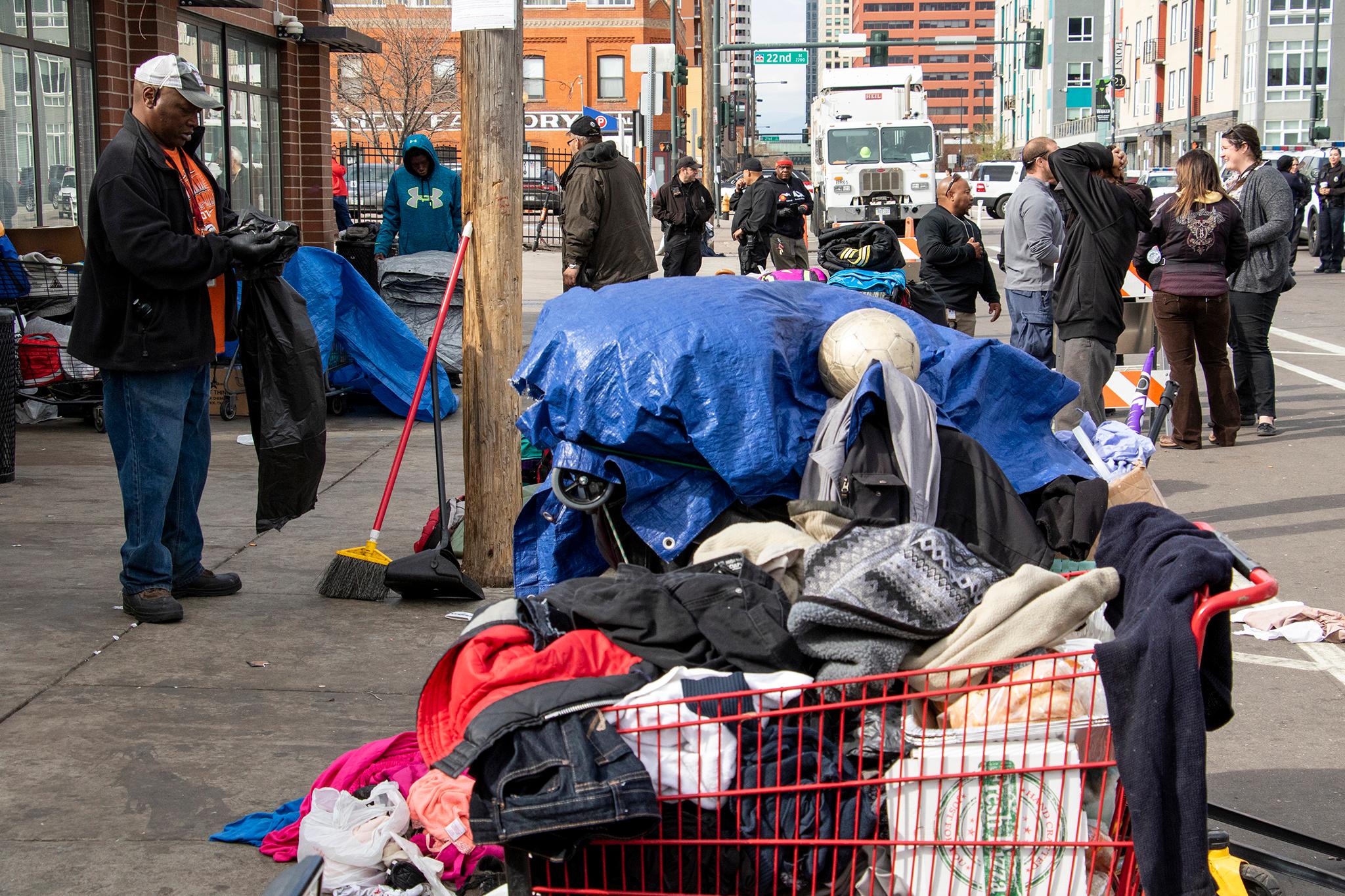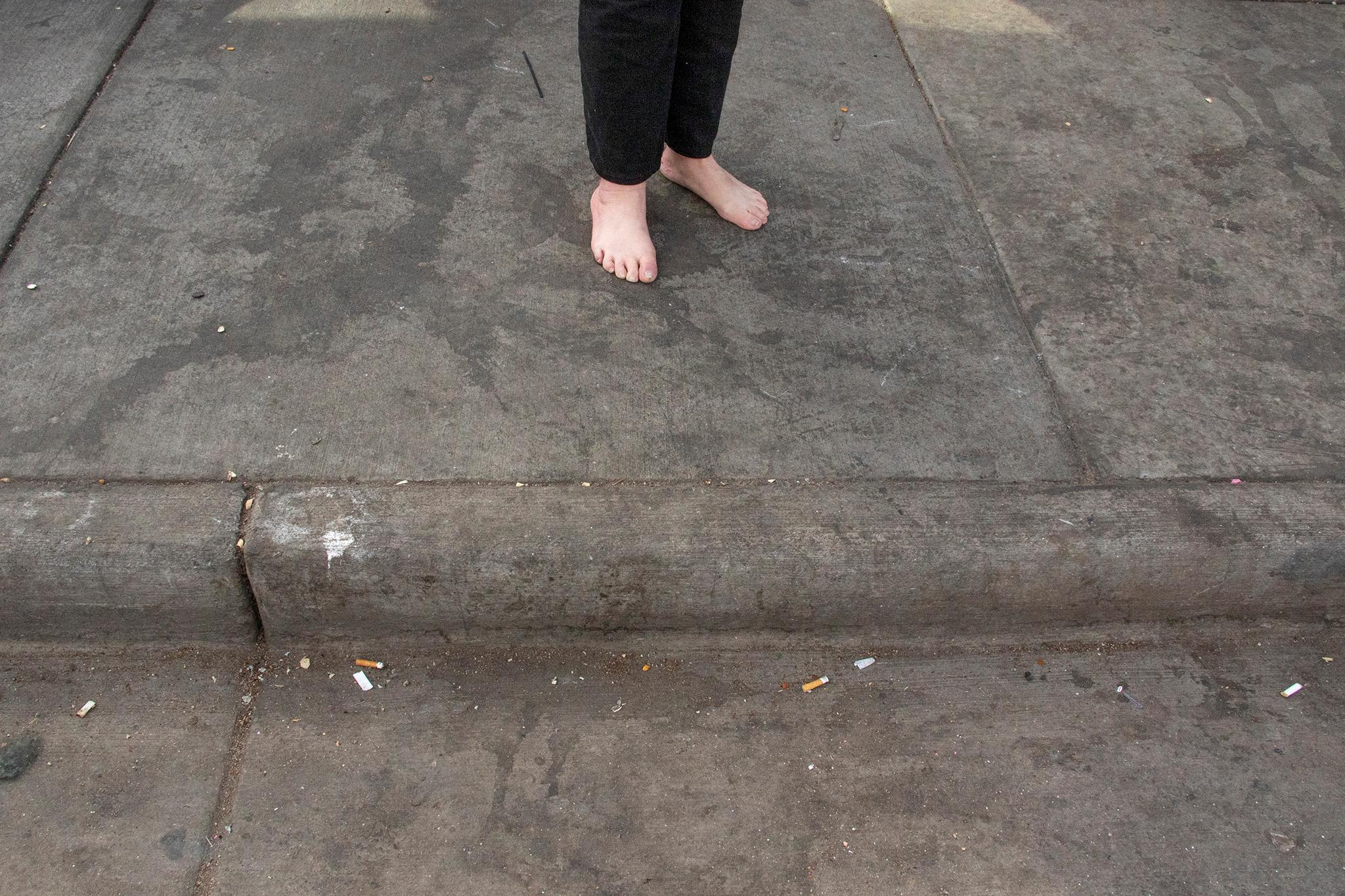A man moved awkwardly but quickly, pushing a bike loaded with blankets and bags down the alley behind the Denver Rescue Mission's Lawrence Street Shelter. A police officer told another man on nearby pavement, "You've got to get up and go someplace else." Brandy Majors sat in her wheelchair contemplating her next move as city workers prepared for a clean-up to address health concerns along the sidewalk that she and her friends call home.
"We have to figure out what to do. What to do," Majors said Wednesday morning. "I have no idea (where). I just want to go wherever my friends go."
Danica Lee, director of public health inspections for Denver's Department of Public Health and Environment, said that for a week or less the area around the mission at 22nd and Lawrence would be closed day and night except for people passing through or lining up for services. It's a corner of Denver that draws both people seeking aid from the mission and nearby nonprofits and, at night and on weekends, people seeking relaxation at pubs and restaurants.

As the cleanup started Lee joined staff posting closure notices on street posts. She said advance notice was not required for steps taken because of health concerns.
Public Health and Environment was the lead agency for an operation that also involved police, Public Works and Denver's Road Home, the city agency that coordinates homeless services. Lee said information was being distributed about shelters and health services.
"Part of what we're trying to encourage people to do is to go to indoor spaces," Lee said. "They're certainly safer than outdoor spaces without any sanitation."
Majors, the woman in the wheelchair, said she has struggled with feeling crowded and institutionalized in shelters. She prefers to camp outside, but wants to be near places like the mission, which offer health care and food to the needy whether or not they sleep inside.
"A lot of us don't want to go inside for a lot of reasons," Majors said.
As he walked away from Denver Rescue Mission Wednesday morning, Michael Newport II said he spends nights in shelters, but sometimes days with friends near the mission. Wednesday he was thinking of going to a library, where he likes to read books about the Denver area's wild edible plants.
Newport was philosophical about being moved along: "Basically, it's not our sidewalk. It's the cops'. They're the ones that own the sidewalks."
Newport acknowledged that in a part of town where he's seen people defecate and spit on the streets, clean-ups like the one that started Wednesday were "very, very important."

Public Health's Lee said possible "biohazards" in the area included human waste and discarded drug paraphernalia. Denver Fire Department staff was on hand because propane tanks have been discovered during similar cleanups.
"You never know what you might find out here," Lee said.
She said that people living in homelessness in other cities in the state have been hit by outbreaks of hepatitis A. The liver ailment is caused by a virus usually spread in food or drinks contaminated by small amounts of feces from an infected person. Lee said her department has been trying to be proactive about hepatitis A and other diseases associated with poor hygiene conditions.
For the last six months, Public Health staff have been posting signs in shelters underlining the importance of keeping hands clean.
Wednesday's clean-up was undertaken under health regulations, not Denver's ban on urban camping.
This week, Denver voters are being mailed ballots for the May 7 municipal election that include Initiative 300, a proposal to eliminate the ban. Proponents say the camping ban violates the rights of people living in homelessness. Opponents, including homeless service providers, say 300 is so broad and vague that it could hamper efforts to help those without homes and restrict the city as it strives to maintain health, safety and order.
Ryan Luby, a spokesman for the city attorney's office, said it was unclear whether cleanups like Wednesday's would be affected if voters approve 300.
Denver Homeless Out Loud, an advocacy group with people who have experienced or are experiencing homelessness among its leaders and organizers, gathered petition signatures to get 300 on the ballot. The group has raised its own health concerns, working with University of Colorado Denver researchers to survey 484 people experiencing homelessness in Denver. Among other issues, the survey asked people to describe their ability to access a place to wash. In all, 45 percent said it was extremely or very difficult.
Denver Homeless Out Loud helped bring a class action suit against the city over how the camping ban has been enforced since City Council made it law in 2012. In a settlement announced earlier this year, the city agreed to provide portable toilets for people living on the streets and to make it easier for such people to use city rec centers, where showers are available. The settlement has not yet been finalized or implemented.
Those interviewed for the Denver Homeless Out Loud survey also spoke of sleep being interrupted by police officers asking them to move along and the resulting stress. Heat stroke and frostbite also were reported.
"When people face this kind of police harassment and worry about warrant checks, citations and arrests, it is no surprise that our survey data shows that they often choose not to shelter themselves from the weather," the Denver Homeless Out Loud researchers said.














